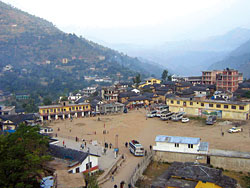|
|
Nepal's Maoist war started 11 years ago when the Maoists attacked Rolpa's Holeri police station on 13 February 1996. It has been two years since the war ended and the Maoists have entered mainstream politics and even the governing alliance. But all over the country, Maoist cadres openly carry weapons, collect donations by force, beat and threaten people.
Although the rest of the country is complaining about the unreformed behaviour of the Maoists, here in their heartland the former armed rebels are on a public relations drive.
Political relations with other parties have improved. Local altercations have started to be resolved peacefully. Maoists have begun to abide by the laws of the state and to seek out the police when problems occur. If cadres do something illegal, swift action is taken by the leadership. Rolpa's residents, observing these changes, have started to feel more hopeful and secure, and it is because of this that the Maoists are more popular here than anywhere else. In fact, Rolpa should be a model district for the Maoists.
"Rolpa has changed," says NC chairman Krishna Bahadur Dharti. "Political ties are strengthening and development work have started jointly, all the way from the district headquarters to the villages."
Previously, Nepalis working overseas were a steady source of income for the Maoists. When these people came home, they had to pay revolutionary tax. They were also required to make a deposit in the self-styled People Power Bank. Those who refused were often abducted.
Last May, irate locals in Bhawang seized a Maoist known as Comrade Sagarmatha, accused him of extortion and demanded that all his expenditures be made transparent and their deposits returned. The situation escalated and they beat up Sagarmatha. To contain the situation, the local Maoists, police and others held a meeting. Maoist in-charge Dipendra Pun (Comrade Sijal) admitted his cadre had made a mistake, publicly apologised and offered compensation of Rs 30,000 to the victims. For the first time, not just in Rolpa but in all of Nepal, the Maoists had admitted they had made a mistake and actually paid compensation.
"Besides the usual small fracas, nothing major has happened since then," says Rolpa police chief Basanta Lama. "If the cadres make any mistake, the Maoist leadership immediately takes action. That has made it very easy for us."
A year ago, Rolpa was still a war zone despite the ceasefire. Even though the Maoists no longer carried guns, residents were no less frightened. But now former Maoist ministers attend functions hosted by other parties, proclaiming "it is time to work together".
Hari Prasad Dharti of the UML confirms the Maoists have improved, and even Maoist district secretary Resham Pun agrees. "Yesterday, we were at loggerheads with the other parties. Now, there is that much more friendship," says Pun.
The Maoists have even helped to rebuild the police station they themselves destroyed during the war. In the past, they had said all police matters would be handled by the YCL, but recently when a cadre was beaten up in Khungri the Maoists asked the police to help. "The same Maoists who would use any small mistake by the police to create a major fight are now working alongside us," says Lama.
The word has spread to the internally displaced from Rolpa. On 5 November, 105 displaced families of 24 Rolpa villages returned home. Secretary Pun was heard directing his cadre on the phone: "Let there be no use of force from us. Even if the displaced express anger and violence, do not retaliate. If they don't have food or shelter in their homes, then help them. If violence could solve everything, then we would have had our government a long time ago."
When the war ended, Rolpa was entirely in Maoist hands. They blockaded the security forces to starve them out. But while supplies were airlifted in for the security forces, locals suffered. Rolpa's district capital of Libang was surrounded by three layers of barbed wire. A daily curfew started at five o'clock. Today, Libang is bustling till late at night and citizens who have lived in the shadow of fear now walk around with smiles on their faces.
Rolpa's Maoists have shown they are different from the Maoists of Bara, who killed a journalist, or the YCL in Kathmandu who beat up doctors. Says Maoist secretary Pun: "National politics have their own place. It is up to us to take positive steps in our own district."
Now, if only the rest of his comrades followed suit.
RELATED ARTICLES
Farewell to arms?
Sink or swim



